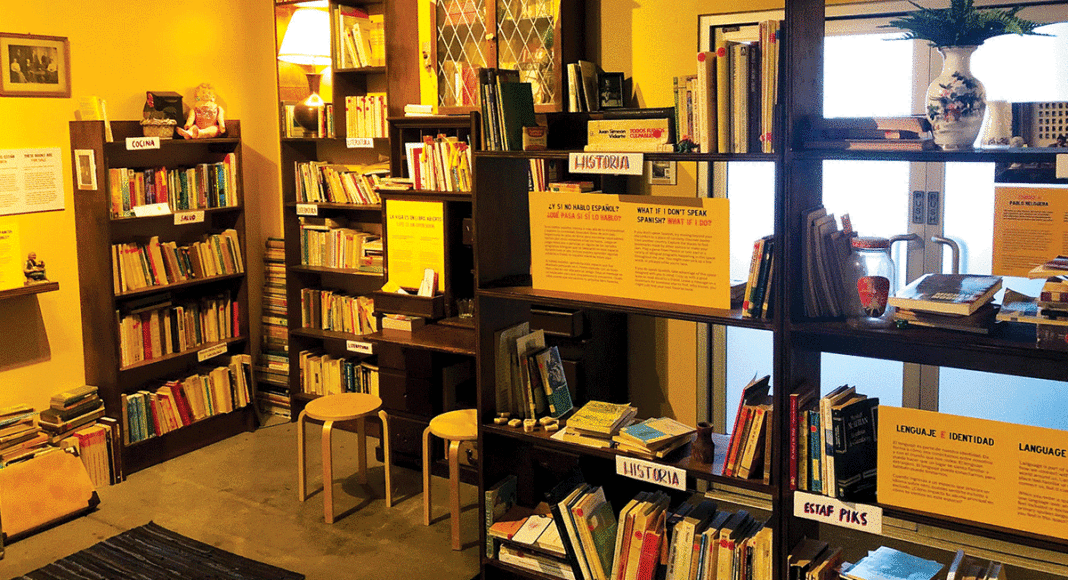Pablo Helguera only thought his art project would run for a few months. But six years later, he’s still collecting books and getting invitations to set up shop in cities across the U.S.
Helguera, a New York-based artist, opened the first Spanish-language bookstore in Brooklyn, Librería Donceles, to address a lack of bookstores that serve the growing Hispanic and Latin communities in the United States.
“Books are quickly disappearing. Brick-and-mortar bookstores are having a hard time keeping up with giants like Amazon,” Helguera says. “The experience of the book has completely changed, but that doesn’t mean that we can’t appreciate the very physical, sensory experience of the book. That can’t be transmitted online. Through this art project, I am trying to create an experience of reading and learning and living that I feel is getting lost.”
The exhibit is a pay-what-you-wish bookstore, with all proceeds benefiting Latin organizations. The Librería has set up in the Museum of Art and History (MAH)—replacing the Chamber of Heart and Mystery—this month. All proceeds support the Hablamos Juntos Project run by the Young Writers Program Santa Cruz. The name Librería Donceles comes from Donceles Street in Mexico City, a second-hand bookstore destination. “The stores were packed spaces where you’d get lost,” Helguera recalls. “It was an expedition to find something interesting there.”
Fast forward to New York in 2013. There were around 2 million Latinos and not a single Spanish-language bookstore. “To me, it was ironic that we had such a big Latinx population and no books,” Helguera says. “I felt it would be really important to address this issue through an art project. That’s when I started accepting book donations from Mexico.”
The response was so enormous that Helguera had to fundraise to ship all 20,000 donated books to the U.S. Mexican libraries donated, as did families and other people looking to get rid of clutter. The exhibit received every kind of book imaginable, from student textbooks to poetry, cooking and children’s books. The art project became a miniature Donceles Street. It’s intimate and comfortable, but also new and different, like a stranger’s living room.
“People had very emotional and strong responses to some of the books that I had for sale,” Helguera says. “They remember different parts of their lives, editions from the past. Books contain parts of our lives, and that’s something that became very clear from exhibit.”
Despite the strictly Spanish content, Helguera notes that there is more about the exhibit than the books that resonates with people. It’s the cultural exchange of information and experience that is particularly impactful to everyone, including non-Spanish speakers. It’s the freedom to get lost in the store, to thumb through old editions and marvel at found objects in the pages.
“When we opened the bookstore and started going through all of the donated books, we started finding things,” Helguera says. “From movie tickets to love letters, business cards and pressed flowers and religious images, we found things—secrets—that people put in their books. They become biographies of people’s lives. That can’t happen digitally.”
Helguera references his upbringing as some inspiration for the project. Growing up without the internet, he often looked to books for entertainment, many of which were handed down from his relatives.
“In the past, you could give your books to your kids, which is why I have my parents’ and grandparents’ books. But I can’t give my daughter my iTunes library, because I don’t own it. I am leasing those songs, they are never mine,” he says. “There is something special about really owning an object.”
The project has been to California before, including a stop in San Francisco’s Mission District. Helguera says that California in particular has an interesting response because of the large number of Hispanic and Latino residents, compared to other stops like Anchorage, Alaska. “Anchorage has maybe a 3% Latino population, but still lots of people came because it was such an exciting and new thing to experience,” he says. “In California, the reception is different. There are a lot more people that remember books from their childhood, or can resonate with particular stories. It’s fascinating.”
Librería Donceles runs through next summer at the Santa Cruz MAH, 705 Front St., first floor Lezin Gallery, Santa Cruz. 429-1964, santacruzmah.org.













